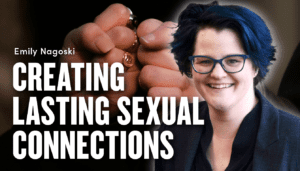 In light of a statement on LDS.org declaring, “An inability to feel the spirit … is often a symptom of poor mental health,” Natasha Helfer Parker, MFT CST and John Dehlin, Ph.D. are joined by our guest Matt to speak about his experiences with Mormon faith crisis, depression, and suicidality—issues he has dealt with for 20 years.
In light of a statement on LDS.org declaring, “An inability to feel the spirit … is often a symptom of poor mental health,” Natasha Helfer Parker, MFT CST and John Dehlin, Ph.D. are joined by our guest Matt to speak about his experiences with Mormon faith crisis, depression, and suicidality—issues he has dealt with for 20 years.
According to Matt, it makes him angry to read that his struggles were a trial, test, or blessing from God, or that he could have been healed if he had more faith, prayed, or hadn’t “sinned.” Matt believes that religious observance is not a cure for mental health illness, and in these episodes, Natasha and John discuss how Mormonism, and in particular a faith transition in the context of Mormonism, can exacerbate the symptoms of depression.
___________________________
Part 1: Natasha and John discuss depression and then introduce our guest, Matt
Part 2: Matt shares his faith transition and how it affected his mental health
Part 3: Natasha, John, and Matt discuss the LDS Church’s statement regarding mental health and the ability to feel the “Spirit”
___________________________
Part 1:
Part 2:
Part 3:
Part 1
Part 2
Part 3




10 Responses
I think religion is one thing that fosters mental illness. And Mormonism is quite adept that that. And when it happens they turn it around and blame mental illness on a lack of obedience to ecclesiastical authority. So the cure… blind obedience of course.
I would be curious to see your evidence for this statement. Generally, religiosity can serve as buffer against several forms of mental illness. Some factors, such as one’s conception of god (benevolent vs. punitive), mediate the efficacy of religion on mental health, but in the clinical literature religion typically has a positive influence.
I think that you people are totally taking the statement on LDS.org out of context, and that it lamentable that it makes some of you “angry” to read stuff like that. However, I wish you would look at it from a different point of view, respectfully.
I think it is not suggesting that somehow you are being blamed for something that is not your fault. I also suffer from things that are not my fault, and I don’t think that the LDS hierarchy are suggesting to me that religious observance is an antidote to what I go through. But to me, it does happen to make sense that not all people feel the spirit or experience it in the same way, and it also makes sense that the way that you feel or experience the spirit can change based on circumstance. And so, it is in fact on you to figure out in what way the spirit will speak to you, especially when circumstances in your life and health change, and it does make sense that not all will feel it through the burning of the bosom. And in fact, it does make sense that mental illness can affect whether someone feels or experiences the spirit in the same way that they used to if something has dramatically changed. And in fact, they may need to seek for what other mode or gift the spirit is using to speak to them. And so, regardless of what someone is going through, I maintain that still is their responsibility to figure out how the spirit is speaking to them.
Religious observance is not a cure for mental illness for sure. Good medical help is a way to deal with it. Religious observance is ONLY a cure for not having the Spirit as a result of non-observance. Non-observance and non-obedience will always result in a loss of the intensity of the spirit, even if not a total loss of it. Sorry. So I respectfully disagree with you and with the subject matter of this interview. The responsibility for feeling or experiencing the Spirit always does lie in the individual, and whether that individual is obeying or not, to what degree they will experience it. And it is also their responsibility to figure out how this communication or experiencing will manifest, or in other words, it is up to you to figure out through which type of spiritual gift this communication will manifest. This is entirely the responsibility of each person, and this has never changed. And I don’t think that the church is suggesting that religious observance is an antidote for mental illness. Rather, they are putting the responsibility on each individual to maintain their spirituality and their standing in the Church and with God through whatever challenges they are called to pass through in this life, and regardless of what we go through, that responsibility has not changed, and is not an antidote to any human condition.
Here is my article that relates to this. Thank you.
https://thoughtfulmormonism.blogspot.com/2017/02/the-holy-ghost-and-umwelt-is-burning-in.html
“Feeling the spirit” is a self-perception. You feel the spirit when you believe you feel the spirit and whether or not you believe you feel the spirit has to do with the premises you have and have not accepted and your current state of mind.
It’s therefore impossible to accurately correlate “feeling the spirit” to any other operationalized variables like mental health diagnoses. The operationalization of “feeling the spirit” would have to include some sort of complex self-report measure that would somehow take into all the variables being thrown around — including belief. The pressure of impending shame for not feeling the spirit would have to be smashed into the operationalization somewhere, too. I have a hard time believing any sort of construct validity could ever be established.
This entire discussion comes from Mormon Land. Both sides of it.
I dealt with undiagnosed depression during my mission in the early 1990s. While the mission president and his wife knew something was definitely wrong with me, the president had no idea what to tell me except to implore me to become more diligent in my missionary work. While the other missionaries expressed disdain for me because of my lack of missionary zeal (i.e. cockiness), the president’s wife was probably the only person who expressed genuine concern, even violating the rules of male/female contact by giving me a hug and a kiss on the cheek because she had no idea what else she could do. About a year-and-a-half into the mission, I was having delusions that the mission president had spies posing as normal people (i.e. shop keepers sweeping the sidewalks in front of their shops, etc.) to watch me. Fortunately, it wasn’t long after this point that I was sent home after an inappropriate interaction with a girl (a very welcomed experience after more than a year of feeling what seemed like unrelenting hostility and isolation). I reported the indiscretion to the president myself by calling him up the next day and stating simply that “I’ve lost my soul”. A few years later, my sister entered a psychiatric hospital for extreme depression, and when she got out, she used the experience to educate our family about depression and implored some of us to recognize the illness in ourselves and to seek help. Neither me nor my sister find it beneficial to remain active in the church anymore.
The Savior has already made it clear that His Spirit is not here; the members of the church just haven’t read the memo yet: “I, the Lord, am angry with the wicked; I am holding my Spirit from the inhabitants of the earth.” Doctrine and Covenants 63:32. Nobody is feeling the Spirit. Not the leadership of the Church. Not the members. Nobody. People who think they feel the Spirit are delusional.
Such an impressive interview. My husband and I have recently hit a faith crisis. I am hopeful that I will be able to come out the other end of this, with peace and contentment. Watching podcasts like this releases fear and is a way of receiving help in transitioning.
Once again, THANKYOU
Thank you so much for these episodes. I have dealt with depression since I was a teenager. My faith crisis worsened my depression substantially. I get tired of people in the church being so unwilling to talk about the realities of depression and about faith crisis situations. Avoiding these topics do not ever make things better! Thank you for always being willing to keep addressing both of these issues. You are saving countless lives by doing so. Thank you for being a lifeline for so many of us and giving us hope that we aren’t able to get elsewhere.
I was married to a man who suffered from a terrible, and at the time untreatable mental illness. He could at times receive powerful spiritual experiences, ones I knew were real because I was receiving the same ones. But he became more and more disturbed and did and said terrible things. Our Church leaders did not understand what was happening. Unfortunately, they followed the usual path, counseling with him until he wore them out, then referring us to a marriage counselor at my request, then finally excommunicating him for his behavior. The pattern continued following his rebaptism. I don’t believe the leaders ever grasped what was actually happening to him. I wish they offered better training to our bishops, stake presidents and general authorities about mental illness, especially the kind that causes psychotic breaks with reality. Their untrained responses can truly affect the eternal outcomes for people’s marriages.
I have had two people in my life who have committed suicide…My sister and her husband …several years a part…I need help in being okay again in my guilt for dealing with this..even now many years later. Since suicides, my resignation from the church created such deep regret and suicidal experience of my own. After many years I try to grapple as to what is my fault..thank you for this podcast. I don’t know where I will end up in the end. Many years of waste is not redeemed even if I have good days. But spirit or no spirit…it is the same.
Best to all of you.